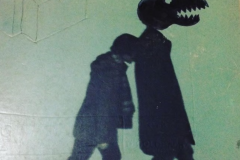From The Horse's Mouth: Equals on Tracts

Austin art rock quintet Equals‘ music is dramatic, yet joyous and playful. The songs may sound simple at first, but complexity shines through after careful listening. Every song is meticulously arranged by bassist Alex Guzman, drummer Matt Toman, keyboardist Logan Wexler and guitarists Dylan Storey and Simon McDonald. Each part of every song — from the angular pulsing rhythms to the crisp, eclectic samples — has a purpose.
The organic elements interweave with the synthetic elements, providing texture and layers that are extremely difficult to pull off live. Click tracks be damned, they fearlessly recreate multi-layered loops and samples, gracefully operating on the bleak notion that one wrong move can end a song in failure. Equals executes flawlessly, with character behind every note.
For Equals’ debut full-length album Tracts, they joined producer Alex Bhore (This Will Destroy You) in the studio, recording nine songs, an expansion to their 2011 debut self-titled EP. The songs flow together, providing the soundtrack to a journey that feels forthcoming, unrealized until the final track. Unlike the band’s previous EP, the album was recorded in one place at Cacophony Recorders in Austin and mixed at Elmwood Studios in Dallas, giving it a more cohesive sound. Working with Bhore again, their new offering is larger, more energetic, with a unique sonic palette of strings, glockenspiel, piano, analog synthesizers, various percussion instruments, field recordings and even vocals.
Tracts will be available on LP, CD and download on May 6, and Ghettoblaster caught up with the band to chat about it. This is what they told us.
When did you begin writing the material for your upcoming album Tracts?
We began writing these songs in 2012. We had played six of the songs live in our set before recording them, the other 3 we learned to recreate live after the CD was done.
What was the most difficult song to take from the initial writing stage through recording and mixing? Why was it so troublesome?
For our last record, all of the recording and mixing was done inside of ProTools and it gave us a lot of flexibility with changing things after the fact and making stems as well. For this record, we tracked in ProTools at Cacophony Recorders in twp weekends, and did mixing in one long weekend at Elmwood. All the mixing we did through analog gear, which has its advantages and disadvantages. The advantage was that the Neve console we mixed on and the outboard gear we used all sounded great and we didn’t have to spend hours dialing in plugins. The disadvantage was all of the mixes had to be made, printed, and then we had to unplug all of our patches to mix the next song. So, after a song was mixed, it was done and we couldn’t change anything.
“Slab Avalanche” was produced on an MPC and then all of the tracks were exported for mixing, and that took some time to beam over, but I wouldn’t say any of them were too daunting to transform from song to recording. We have each been recording music for a while so “How are we going to record this?” is in the back of our heads whenever we write something, which can be limiting. We would rather be asking ourselves “How the hell are we going to play this live?” That’s us. Write something so layered that five people shouldn’t be able to play it, then learn to play it.
Which of the songs on the record is most different from your original concept for the song?
“Telefoto.” That also started out as an MPC song that Matt (drums) made. The original sounds like an R. Kelly song (TP-2.com era), but when we play it loud and live, that R&B feel sort of goes away and it rocks. The acoustic part at the end was going to be a transition, but we found that it fit neatly at the end of this one. We might put the original out one day. All of the original bedroom recordings of these songs are smoother and cleaner and nicer. They sound nothing like our live sound, but it’s funny to think about what life would be like if we did sound like that.
Did you have any guest musicians play on the record?
Mathew Hagerman plays the viola on beginning of “Glistener”. Logan (keys) wrote the parts out and he came through one day and we tracked it at Matt’s house. A few people have noticed the viola and really enjoyed it. Roger Sellers is Matt’s roommate, and happens to be a stellar musician. He did the vocals on the end of “Glistener” as well as one of the acoustic guitars on the end of “Telefoto”.
Who produced the record? What input did that person have that changed the face of the record?
Alex Bhore was the producer on this record as well as our EP. The most important aspect of a producer is that they understand what we are going for. Alex has always really understood our intentions. This is all in addition to his actual engineering and mixing talent. With instrumental music, it’s easy for people to listen to your music in a lot of different ways and contexts. We do our best to make sure people are listening to the music the way we listen to it, but at a certain point, you have to let it go.
Is there an overarching concept behind your new album that ties the record together?
There isn’t one concept that we had in mind the whole time when making the record. These were just all of the songs that made up our bands current sound. That being said, as the record came together, a few ideas came to light. The first part of the album is playful, the second part grinds a little harder and climaxes on “Sweat House”. “Reality Always Disappoints” was a very satisfying denouement, we felt. So, no album concept per se, but we put it together in a very album-y way. We hope.
Have you begun playing these songs live and which songs have elicited the strongest reaction from your fans?
The only song we have not played live yet is “Reality Always Disappoints”. I would say that the strongest reactions have been for “Autotelic”. It transforms from a “Gangster’s Paradise” driving, feeling song to a full on Jason-Statham-driving-80-miles-an-hour-in-reverse barn burner. People have been very receptive.









Social Media